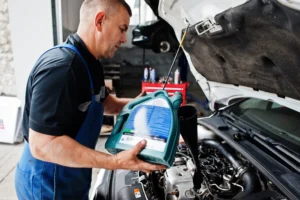Your car’s transmission is one of its most vital components. It’s responsible for transferring power from the engine to the wheels, ensuring smooth acceleration, controlled deceleration, and efficient performance. Despite its importance, many drivers overlook transmission maintenance—often until major (and expensive) problems occur.
Knowing when your vehicle needs auto transmission service in Lakewood can save you thousands in repairs, prevent dangerous breakdowns, and extend the overall lifespan of your car. In this comprehensive guide, we’ll explore the warning signs of transmission trouble, explain why timely service matters, and share expert tips to keep your transmission in peak condition.
Table of Contents
ToggleWhy Transmission Service Is So Important
The transmission is like your car’s heart. Without it, your vehicle simply can’t move. Regular service ensures:
- Smooth gear shifts for safe and comfortable driving.
- Efficient fuel economy, preventing wasted gas.
- Longer vehicle lifespan, reducing the need for costly replacements.
- Lower repair bills, since small issues are caught early.
Ignoring your transmission can turn minor maintenance tasks into catastrophic failures. That’s why paying attention to early warning signs is critical.
Top Signs Your Car Needs Transmission Service
1. Slipping Gears
If your car randomly changes gears or has trouble staying in gear, your transmission may be slipping. This is often caused by worn-out gears or low transmission fluid. It’s not just inconvenient—it can also be dangerous while driving at high speeds.
2. Unusual Noises
Whining, humming, buzzing, or clunking sounds when your car shifts gears usually indicate a transmission problem. Healthy transmissions operate quietly, so new or unusual noises are a red flag.
3. Delayed or Rough Shifting
Does your car hesitate before shifting? Or maybe the shifts feel jerky instead of smooth? These are common symptoms of worn-out transmission fluid or internal component issues.
4. Transmission Fluid Leaks
Transmission fluid is usually red or brown. If you notice puddles under your car, schedule service immediately. Even small leaks can cause your transmission to overheat and fail.
5. Warning Lights on Dashboard
Modern vehicles often alert drivers to transmission problems with a warning light—sometimes labeled “Check Engine” or a specific transmission indicator. Don’t ignore it.
6. Grinding or Shaking Sensations
Manual transmissions may grind when shifting gears, while automatics may shake during acceleration. These signs almost always mean service is required.
7. Burning Smell
A burnt odor often indicates overheated transmission fluid. This condition causes friction and can severely damage internal components.
Common Transmission Problems and Their Causes
- Low or Dirty Transmission Fluid – Fluid breaks down over time, reducing lubrication and cooling.
- Worn-Out Clutches or Bands – These parts control gear changes and wear out with age.
- Torque Converter Issues – A failing converter can prevent smooth power transfer from engine to wheels.
- Software Malfunctions (in Modern Vehicles) – Many automatic transmissions rely on computerized systems that may need updates or recalibration.
- Overheating – Heavy towing, stop-and-go traffic, or neglect can cause overheating, damaging parts.
The Role of Transmission Fluid in Vehicle Health
Transmission fluid isn’t just “oil.” It performs several critical functions:
- Lubricates moving parts to prevent wear.
- Cools the transmission by dissipating heat.
- Provides hydraulic pressure to engage gears.
- Keeps components clean by suspending debris.
When fluid becomes dirty or low, your transmission struggles to function properly. That’s why fluid checks and changes are the foundation of transmission care.
How Often Should You Service Your Transmission?
Service intervals depend on your car and driving habits:
- Automatic Transmissions – Typically every 30,000 to 60,000 miles.
- Manual Transmissions – Fluid changes are less frequent but still essential, often every 60,000 to 100,000 miles.
- Severe Driving Conditions – Towing, mountain driving, or heavy city traffic may require more frequent service.
Always follow your manufacturer’s recommendations in the owner’s manual.
DIY Checks vs. Professional Service
Drivers can:
- Check fluid levels and color.
- Watch for leaks under the car.
- Pay attention to unusual sounds or sensations.
But full transmission service—like flushing old fluid, replacing filters, or diagnosing internal problems—requires specialized equipment and training. Trusted mechanics in Lakewood have the expertise to prevent minor issues from becoming major repairs.
Preventive Tips to Extend Transmission Life
- Check and Replace Fluid Regularly – Don’t wait until it’s burnt or dirty.
- Use the Manufacturer-Recommended Fluid – Wrong fluid can damage the system.
- Avoid Overloading or Overheating – Heavy towing strains transmissions.
- Shift Gears Properly – For manuals, avoid riding the clutch. For automatics, pause before shifting from reverse to drive.
- Schedule Regular Inspections – Professional checkups catch problems early.
The Cost of Ignoring Transmission Service
Skipping service can lead to:
- Complete transmission failure ($3,000–$7,000 to replace).
- Reduced vehicle lifespan.
- Poor fuel economy.
- Sudden breakdowns on the road.
By comparison, routine maintenance like fluid changes ($100–$250) is a fraction of the cost.
Conclusion: Don’t Wait for Transmission Trouble
Your transmission is too important to ignore. By recognizing the early signs of trouble and scheduling timely service, you’ll save money, ensure safety, and extend your car’s life.
If you’re noticing slipping gears, leaks, or strange noises, don’t delay. Schedule your transmission service today with our trusted Lakewood mechanics—and drive with confidence tomorrow.







